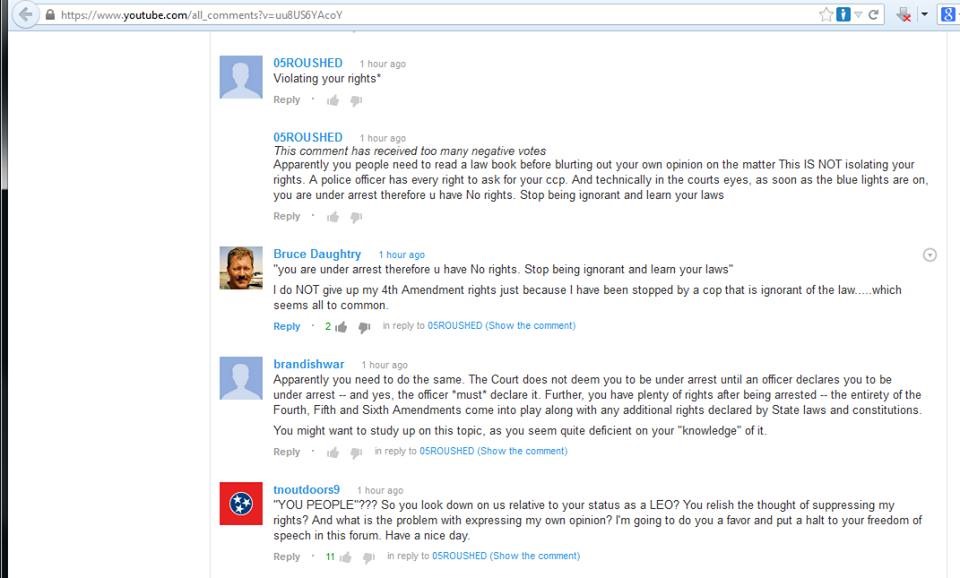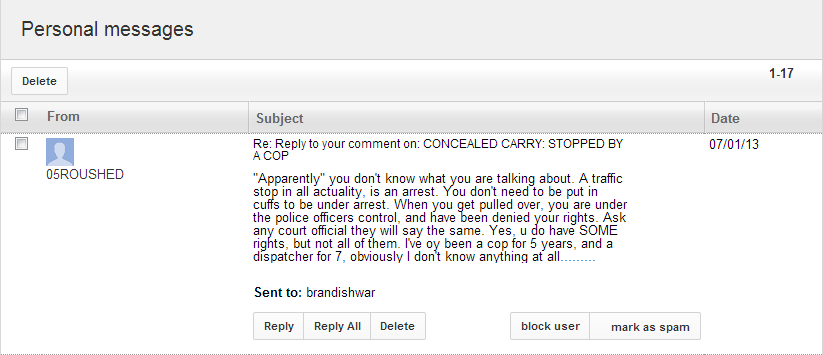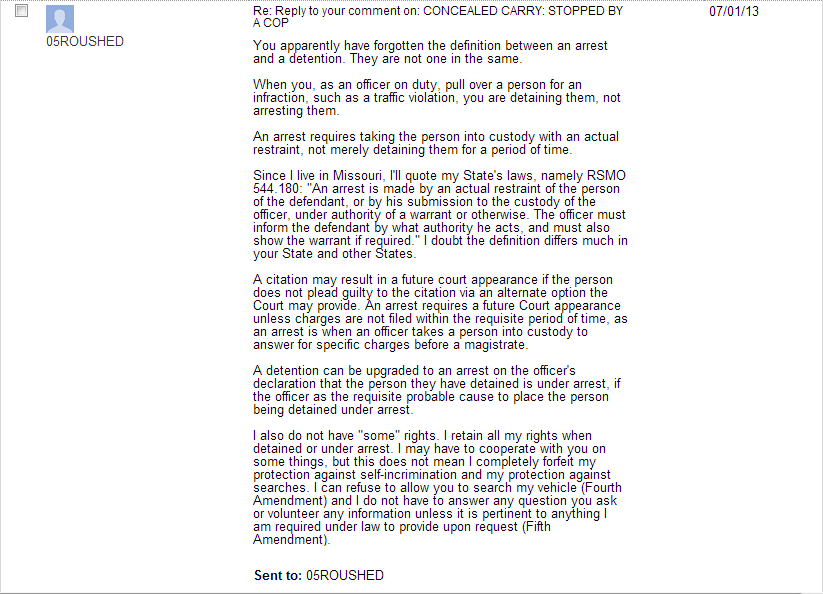Recently a person on YouTube named TnOutdoors9 posted a video discussing his recent experience when he was pulled over by police for a broken taillight. Now he also had a weapon with him, being a permitted carrier of a concealed weapon, and did the right thing in informing the officer of the presence of the weapon when retrieving what the officer would need required going near it. Have a listen:
http://www.youtu.be/uu8US6YAcoY
But what I’m drawing attention to isn’t the video, but rather one of the commenters. In the below image, the person to whom I’m referring is 05ROUSHED and I am “brandishwar”. 05ROUSHED is attempting to portray himself as a law enforcement officer, not in the screenshot below but elsewhere in the comments section to the video:

His comment:
Apparently you people need to read a law book before blurting out your own opinion on the matter This IS NOT isolating your rights. A police officer has every right to ask for your ccp. And technically in the courts eyes, as soon as the blue lights are on, you are under arrest therefore u have No rights. Stop being ignorant and learn your laws
My response:
Apparently you need to do the same. The Court does not deem you to be under arrest until an officer declares you to be under arrest — and yes, the officer *must* declare it. Further, you have plenty of rights after being arrested — the entirety of the Fourth, Fifth and Sixth Amendments come into play along with any additional rights declared by State laws and constitutions.
You might want to study up on this topic, as you seem quite deficient on your “knowledge” of it.
In response to my comment, 05ROUSHED decided to send me a PM:

Text of PM:
“Apparently” you don’t know what you are talking about. A traffic stop in all actuality, is an arrest. You don’t need to be put in cuffs to be under arrest. When you get pulled over, you are under the police officers control, and have been denied your rights. Ask any court official they will say the same. Yes, u do have SOME rights, but not all of them. I’ve oy been a cop for 5 years, and a dispatcher for 7, obviously I don’t know anything at all………
All I can say is that if this guy is or was a cop, I hope I never lived in any of his jurisdictions… But his PM is flat-out wrong. It’s a rather sad state of affairs when I have to educate a law enforcement officer, current or former, on stuff that the officer should know without a second thought. When an officer pulls you over, you are not under arrest, so it is flat-out wrong to say that a traffic stop “is an arrest”.
Here was my reply:

Text of reply:
You apparently have forgotten the definition between an arrest and a detention. They are not one in the same.
When you, as an officer on duty, pull over a person for an infraction, such as a traffic violation, you are detaining them, not arresting them.
An arrest requires taking the person into custody with an actual restraint, not merely detaining them for a period of time.
Since I live in Missouri, I’ll quote my State’s laws, namely RSMO 544.180: “An arrest is made by an actual restraint of the person of the defendant, or by his submission to the custody of the officer, under authority of a warrant or otherwise. The officer must inform the defendant by what authority he acts, and must also show the warrant if required.” I doubt the definition differs much in your State and other States.
A citation may result in a future court appearance if the person does not plead guilty to the citation via an alternate option the Court may provide. An arrest requires a future Court appearance unless charges are not filed within the requisite period of time, as an arrest is when an officer takes a person into custody to answer for specific charges before a magistrate.
A detention can be upgraded to an arrest on the officer’s declaration that the person they have detained is under arrest, if the officer as the requisite probable cause to place the person being detained under arrest.
I also do not have “some” rights. I retain all my rights when detained or under arrest. I may have to cooperate with you on some things, but this does not mean I completely forfeit my protection against self-incrimination and my protection against searches. I can refuse to allow you to search my vehicle (Fourth Amendment) and I do not have to answer any question you ask or volunteer any information unless it is pertinent to anything I am required under law to provide upon request (Fifth Amendment).
Now one thing to bear in mind is that an arrest can occur absent restraints, such as when a person voluntarily surrenders. And a lawful detention can also occur with restraints. The handcuffs don’t always mean someone is under arrest. It just means an officer doesn’t want a person using their hands for some justifiable reason.
For more information on police stops and how to best conduct yourself when interacting with law enforcement, I recommend watching the video “10 Rules for Dealing with Police” by the organization Flex Your Rights.
You must be logged in to post a comment.